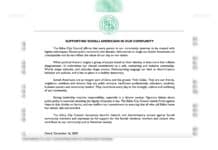The University of Minnesota faces a $166 million budget shortfall as a consequence of shutting down campuses, along with tens of millions of dollars in related revenue, in response to the coronavirus. So the U recently hired the ultimate DFL insider, former state budget commissioner Myron Frans, to come up with a plan to make the red ink go away somehow, someday. He’s being paid handsomely to do it, roughly $450-475,000 annually with benefits and other compensation.
Frans’ plan hinges on the U going tens of millions of dollars more into the red, according to the Star Tribune.
… He and other U leaders proposed taking out an $82 million loan to cover half the shortfall, with the rest covered by $50 million in university fund balances and $30 million in savings from employee furloughs and pay reductions. The Board of Regents will act on the budget plan early next year.
The loan would specifically be used to cover revenue losses in auxiliary services such as athletics and student housing. Those areas should rebound next fall if normal college life resumes, Frans said, and the revenue they generate would be used to pay back the debt.
But not so fast. One longtime fiscal hawk on the Board of Regents wants Frans to go back to the drawing board.
Regent Michael Hsu is skeptical of the plan to borrow such a large sum. The university should more aggressively trim its personnel spending before taking out a loan, he said. The U has more than 27,000 employees, with salaries and benefits representing about two-thirds of the school’s expenditures. As the new CFO, Frans should be leading the charge to cut costs, Hsu added.
“Manage administrative costs down. Freeze tuition or lower tuition. Get us out of this pandemic with the least amount of borrowing,” Hsu said, ticking off his expectations for Frans.
Frans inherits a target-rich environment. The U of M still smarts from a Wall Street Journal expose several years ago that made the school the national poster child for bloated bureaucracies that dramatically drive up the cost of higher education for both students and taxpayers. Since then, the number of university employees has catapulted from 19,000 to 27,000 today, including hundreds of administrators banking six-figure salaries.
That includes Frans and Hsu didn’t hesitate to single him out.
Hsu pointed to Frans’ salary as an example of the “bigger problem” of administrative costs at large universities. As the state’s budget commissioner, Frans made around $155,000 annually. His U salary of $399,000 is more than twice as large, not counting an additional $50,000-$80,000 in deferred compensation he will receive in each of the next five years.
Frans replaced former Senior Vice President Brian Burnett, who made $432,000 annually. The U kept Burnett on as an adviser to the president through Dec. 21, paying him the same salary to help Frans transition into the role.
Next month the Board of Regents will consider Frans’ proposal, which essentially depends on a return to normal on campus. But higher education faces an unpredictable post-pandemic future. Online learning may mark a turning point in the delivery of services that could make some bricks and mortar campuses as outmoded as many big box stores.
Meantime, Frans will kick the can down the road on streamlining the U’s bureaucracy. The eventual plan? Add another expensive consultant to the payroll.
Over the next year, Frans said, he will review how the U sets administrator salaries and look for opportunities to consolidate services. The university is also seeking an outside consultant to help find savings.
— — —
This article was republished with permission from the Center of the American Experiment.










